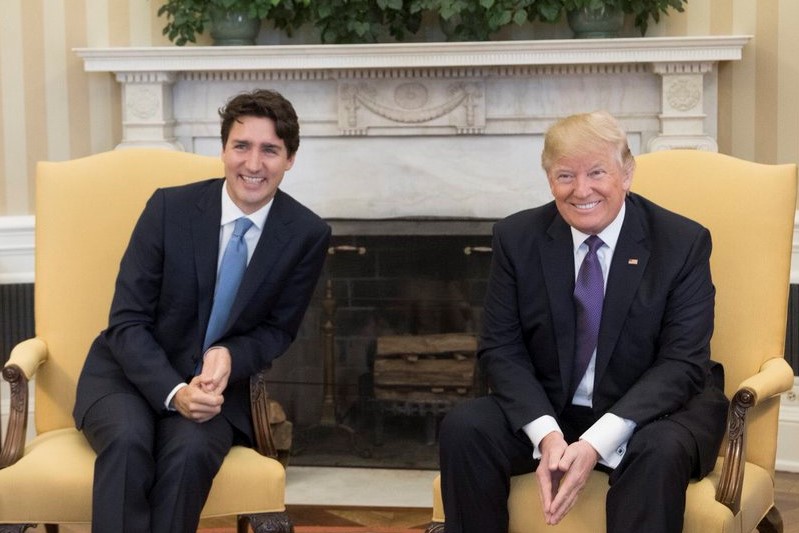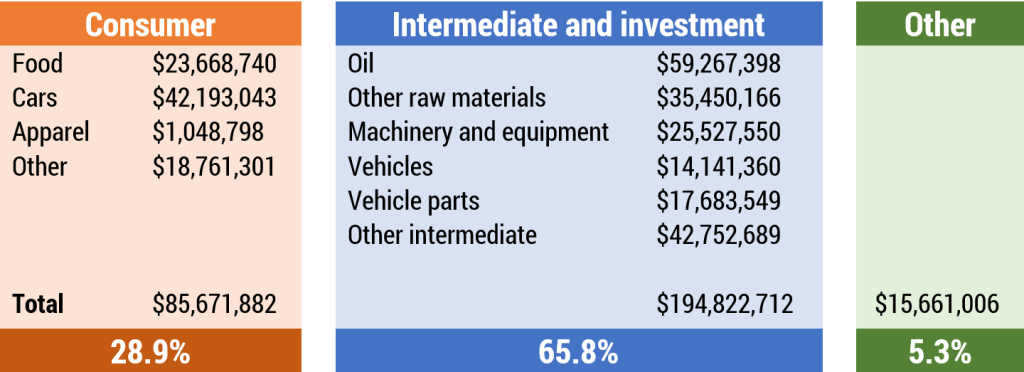Trudeau met Trump on Monday but voiced no criticism. He stayed mum on Trump’s racist travel bans for Muslims and refugees—silent even about Canadian Muslims being arbitrarily denied entry at the US border. Many commentators in the media were quick to jump to Trudeau’s defense, excusing his total lack of spine with considerations of real economik: Canada’s trading relationship with the US is too valuable for us to go even mildly criticizing Trump.

Of course, Canada’s economy does rely heavily on the United States. But while over 75% of Canada’s exports go to the US, our trade relationship looks different than what many imagine it to be. And, in fact, the economy is much less of an excuse for Trudeau’s cowardice than it seems at first glance.
Here’s how Canada’s exports to the US break down:
The data is for 2015 and comes from the US Census. This is a simple but informative exercise, one modeled on an analysis J.W. Mason published on his excellent blog a few weeks ago that looked at US trade with Mexico. (I highly recommend J.W.’s piece because it draws some bigger conclusions about how trade is related to the economy at large.)
The main thing to notice is that roughly two-thirds of Canada’s exports go to the US go to American businesses not consumers. We sell twice as many raw materials, machinery, parts and other intermediate inputs for production to US companies as we do SUVs or camping gear to US consumers. This is very different from the picture most of us have of trade, which likely involves only finished consumer products crossing the border.
In his analysis of US-Mexico trade, J.W. Mason found something very similar: about two-thirds of Mexican exports to the US also go the business sector. His conclusion was that Trump’s threatened tariff on Mexican goods would raise costs for US businesses much more than it would cause American consumers to switch and “Buy American”.
My argument is similar but aimed at a Canadian audience: any major breakdown of trade would not only be costly for Canadian exporters, it would also be very damaging for US business. Trump and his team have suggested as much themselves, talking only about “tweaking” NAFTA terms with Canada. (It is highly likely they understand this to be the case with Mexico as well but a brewing trade dispute there is part of something unrelated (and more sinister): fomenting national security and immigration fears.) Remember too that even before NAFTA, trade between our two countries was already very free. In short, an imagined trade war should not be a blanket excuse for Trudeau to avoid criticizing Trump.
None of this is to argue that there is no imbalance in the Canada-US trade relationship or that Canada wouldn’t suffer disproportionately more in the unlikely event of a real trade war. As a friend pointed out, trade with Canada exceeds 10% of GDP in only US two states, whereas all but two Canadian provinces have trade volume with the US in excess of 15% of GDP. But without breaking down how trade functions in the continental economy, these numbers on their own don’t illustrate the degree of mutual dependence between Canada and the US.
The point to remember is that there would be intense pressure from within the US business world to prevent a trade war in the first place. Given today’s highly integrated supply chains, even a proportionately small volume of trade can still be crucial. It matters less that trade with Canada accounts for just 5% of GDP if some of that 5% is specialized parts and inputs that can cripple production. And it’s not that easy to replace Canadian-made goods in this case: doing so would require long-term investments with considerable fixed costs in plant and equipment. It could be done, but it won’t be the result of one critical statement.
Nevertheless, Trudeau acts as if that’s a real risk. Even if there might be no personal love lost between our cosmopolitan neoliberal leader and his nativist protectionist counterpart, officially this week it was all smiles and handshakes. Trudeau ducked questions from reporters at his joint press conference, stating, “The last thing Canadians expect is for me to come down and lecture another country on how they chose to govern themselves.” This condescension misses the fact that a majority thinks that even worsening trade relationships would be a price worth paying for standing up to Trump—nevermind that fears of a worsening are overblown. Past prime ministers have been willing to stand up to US presidents over smaller things despite the trading relationship.
Trudeau has to be aware of Canada’s unequal standing in its relationship with the US but he doesn’t have to cower in the corner waiting for a strike from the bully that may never come. Being in less powerful in a trading relationship doesn’t equate to moral paralysis in other spheres. Economic disruption cannot be a cover for lack of spine. My hunch is that Trudeau knows this—that his failure to stand up to Trump is cowardice that has its source in political calculation not economic necessity.

One reply on “No, Canada’s economy will not collapse if Trudeau stands up to Trump”
I agree completely. Trudeau has been totally subservient to the US in his support of their neoliberal/military/corporate global elite. He also ties Canada’s foreign policy to the US foreign policy. He has made Canada a boot licking sychophant of the US.
Trudeau is not only spineless when it comes to speaking up for Canadian interests, but he is in fact betraying Canadian sovereignty, through his neoliberal policies, which he has been implementing since his party won a majority.